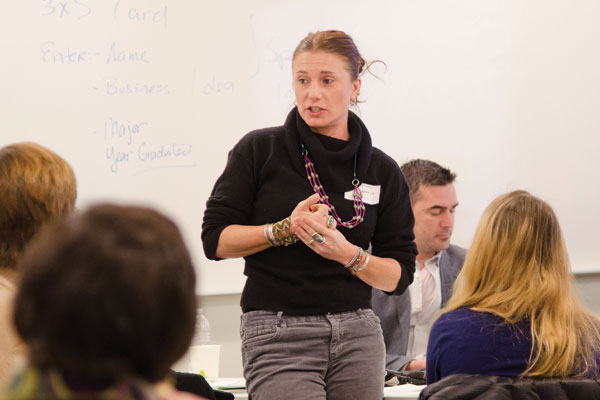Entrepreneurship Initiative Expands
by Robyn Rime
Established in 2012, the School of Management’s Center for Entrepreneurship and Innovation (CEI) is a physical, virtual, and intellectual place where all undergraduate and graduate students and alumni—regardless of their majors—can find support to develop their ideas into new ventures. The center’s activities have expanded to include two new courses in the SOM curriculum: Social Entrepreneurship and Creativity and Innovation.
“A minor in entrepreneurship for management majors was established about a decade ago, but under the direction of the CEI, it was revised in fall 2013 to make it accessible to all majors,” says Gerard F. Zappia ’89G, dean of the School of Management. The new courses are two of the five required for the minor.
“Social entrepreneurs are individuals with innovative solutions to society’s most pressing social problems,” says Jennifer Leigh, Ph.D., associate professor of management and instructor for Social Entrepreneurship. “These change agents leverage business skills, community engagement, and any other resources to address social problems or needs unmet by private markets or government. One of the most famous social entrepreneurs is Dr. Muhammad Yunus, who was awarded the Nobel Peace Prize for his now well-known social innovations of microcredit and microfinance.”
A hybrid class with both face-to-face and online elements (including Twitter), Social Entrepreneurship fosters self-directed learning, focuses on students’ interests related to social change, and bridges the theory-practice divide by emphasizing action projects such as interviewing social entrepreneurs and reading books about social venture start-ups. Since the students come from all parts of the College, they approach social entrepreneurship from various viewpoints based on their majors. “This is precisely the interdisciplinary exchange that social entrepreneurs—or any well-educated individual—needs when joining the workforce,” says Leigh.
Creativity and Innovation, offered for the first time in spring 2014, gives students the opportunity to explore some of the misconceptions of creativity, such as the Lone Creator, Eureka Moment, Creative Type of Person, and Expert Myth. The hybrid course mixes in-class activities with online assignments, many of which give students first-hand experience in pushing the boundaries of creativity. Guest speakers include artists, improv actors, and environmental activists; students also read articles, watch TEDtalks, and respond to online discussions. According to instructor Ted Baumhauer, Ed.D., “It is always interesting how students will respond online in ways they would never verbalize in class, so these activities add a depth to the class discussion.”
Students engage in several projects, including researching a creative individual, presenting a creativity technique to the class, developing an innovative idea and keeping a creativity journal.
Zappia applauds the direction the CEI gives to the entrepreneurship initiative. “The center helps students and alumni to gain more control over their economic future by developing the ability to create opportunities in the marketplace for themselves and others.”
Other CEI activities have included establishing and expanding an advisory council, building connections with University of Rochester and Rochester Institute of Technology, and partnering with Career Services and Alumni Relations to offer workshops for students and alumni.
Robyn Rime is the editor of Connections.

Jennifer Leigh, associate professor of management, teaches entrepreneurial courses focused on student-led learning.
Learn more about the School of Management at naz.edu/management.